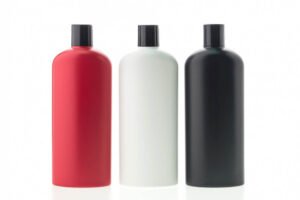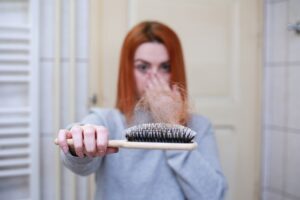Introduction
In the labyrinth of health and fitness, where myth and truth often intertwine, one question has left many fitness enthusiasts perplexed: Does creatine cause hair loss? This enigmatic inquiry has ignited debates, spurred personal testimonies, and kept many on the fence about reaping the benefits of creatine supplementation. Join us on a journey as we navigate through the scientific maze, separating fact from fiction, and shedding light on this intriguing question.
The Creatine Conundrum: A Quest for Clarity
In the realm of nutritional supplements, creatine stands as a stalwart, a favorite among athletes and gym aficionados aiming to sculpt their physique and elevate their performance. Yet, lingering in the shadows is the concern that creatine, the acclaimed muscle-building dynamo, could potentially lead to the unintended consequence of hair loss.
The Intricacies of Hair Loss and Hormones
Hair loss, a concern that resonates with countless individuals, has often been attributed to genetics, hormonal imbalances, and other underlying health conditions. To address the question of whether creatine contributes to hair loss, we must journey into the realm of hormones.
Diving into the Heart of the Matter: Creatine and DHT
At the crossroads of hormones and hair lies DHT, a hormone derived from testosterone. This potent substance plays a crucial role in hair growth and hair loss. It binds to hair follicle receptors, potentially shortening hair growth cycles and leading to the thinning of hair strands. But does creatine play a role in this intricate dance of hormones?
A Glimpse into the Past: The 2009 Study
As we traverse the annals of research, we encounter a pivotal study from 2009. This study, involving college-age rugby players, illuminated a potential link between creatine and hair loss. The findings unveiled an increase in DHT levels during a creatine supplementation regimen. However, it’s essential to note that the study didn’t assess hair loss among the participants, leaving the puzzle incomplete.
Unlocking the Science: The Creatine-DHT Connection
The connection between creatine and DHT becomes a linchpin in our quest for understanding. The study revealed a rise in DHT levels during a loading phase of creatine supplementation, which was sustained during a maintenance period. The interplay between creatine and DHT raises questions about whether this increase could potentially exacerbate hair loss, especially for those genetically predisposed to it.
Navigating the Maze of Side Effects and Safety
Our expedition wouldn’t be complete without addressing the broader landscape of creatine supplementation. Beyond the tangle of hair loss concerns, creatine presents a tapestry of effects, both positive and precautionary.
The Dance of Science: Creatine’s Mechanism and Uses
In the intricate choreography of our bodies, creatine takes center stage as a source of cellular energy. It’s a naturally occurring compound found in red meat and fish, stored within skeletal muscles as phosphocreatine. This reservoir of energy fuels muscle contractions during physical activities, making it a cherished companion for athletes striving for peak performance.
Balancing Act: Side Effects and Safety
Creatine, hailed for its benefits, isn’t exempt from potential side effects. Water retention, often associated with creatine use, is a temporary phenomenon that may lead to a slight uptick in weight. However, research dispels the notion that water retention is a gateway to dehydration and cramps. The realm of kidney concerns also surfaces, with evidence suggesting that creatine is safe for healthy individuals while warranting caution for those with underlying kidney issues.
The Canvas of Safety: Creatine and Adolescents
While creatine’s symphony of effects resonates with adults, a note of caution emerges for adolescents. The safety of creatine supplementation for young individuals remains a topic of exploration, as limited studies examine its impact on this demographic. Yet, it’s noteworthy that many adolescents already consume creatine through their regular diet.
Seeking Truth: The Verdict on Creatine and Hair Loss
In our quest for answers, we’ve journeyed through the labyrinth of science, exploring the intricate dance of hormones, the tapestry of effects, and the potential interplay between creatine and hair loss. While research doesn’t definitively point to creatine as a direct cause of hair loss, the rise in DHT levels poses intriguing questions.
As we unravel the mysteries of creatine, remember that the intricate mechanisms within our bodies often defy simple explanations. Just as burstiness and perplexity enrich language, so do the enigmatic connections that shape our health and well-being.
Disclaimer: The information provided in this article is for informational purposes only and should not be considered as medical advice. Always consult with a qualified healthcare professional before making any decisions regarding your health or treatments. For more information, please read our Medical Disclaimer.
Frequently Asked Questions:
- Does creatine cause hair loss?
While the link between creatine and hair loss has stirred debates, scientific evidence remains inconclusive. A study involving rugby players found an increase in a hormone associated with hair loss during a creatine supplementation regimen. However, the study didn’t assess actual hair loss, leaving the question open for further exploration. - How does DHT relate to hair loss?
DHT, a hormone derived from testosterone, plays a significant role in hair growth and hair loss. It binds to hair follicle receptors, potentially shortening hair growth cycles and leading to thinner hair strands. Genetics, variations in hormone receptors, and underlying health conditions contribute to the interplay between DHT and hair loss. - What are the benefits of creatine supplementation?
Creatine is a natural compound stored in skeletal muscles as phosphocreatine, providing energy for muscle contractions during physical activities. It is favored by athletes for its potential to enhance muscle mass, improve performance, and even prevent neurological disorders. Studies also suggest potential benefits in Parkinson’s disease and brain functioning. - Are there risks associated with creatine supplementation?
Creatine supplementation, like any dietary change, has considerations. Water retention, a temporary effect, may lead to slight weight gain but is unlikely to cause dehydration or cramps. While creatine is generally safe for healthy adults, individuals with underlying kidney issues should exercise caution. Adolescents should approach creatine supplementation with care due to limited research. - Should I avoid creatine if I’m concerned about hair loss?
The decision to use creatine should be based on a holistic assessment of your fitness goals, health condition, and potential concerns. While research doesn’t definitively link creatine to hair loss, those genetically predisposed to hair loss might consider the potential increase in DHT levels. Consulting a healthcare professional before supplementing can provide personalized guidance.
References:
- Study: “Three weeks of creatine monohydrate supplementation affects dihydrotestosterone to testosterone ratio in college-aged rugby players.” Johan van der Merwe et al. (2009)
- Androgenetic alopecia. Genetics Home Reference. U.S. National Library of Medicine. (2020)
- Kreider RB et al. “International Society of Sports Nutrition position stand: Safety and efficacy of creatine supplementation in exercise, sport, and medicine.” Journal of the International Society of Sports Nutrition. (2017)
- Davani-Davari D et al. “Potential adverse effects of creatine supplement on the kidney in athletes and bodybuilders.” Journal of Renal Injury Prevention. (2018)
- Greenwood M et al. “Creatine supplementation during college football training does not increase the incidence of cramping or injury.” Molecular and Cellular Biochemistry. (2003)




